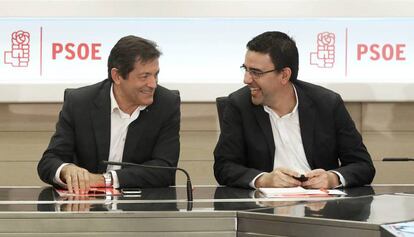Spain’s two main parties finally start talking to each other
But Socialists warn acting PM Rajoy not to expect support beyond abstention at investiture vote

After months of political impasses, communication channels between the caretaker government of the Popular Party (PP) and the main opposition Socialist Party (PSOE) are once again open.
The last four days have produced two conversations between acting Prime Minister Mariano Rajoy and Javier Fernández, head of the management team that is temporarily leading the PSOE after its secretary general Pedro Sánchez resigned last Saturday at a dramatic party meeting in Madrid.
I will not abstain and pave the way for a PP government, even if the Federal Committee orders it
Susana Sumelzo, PSOE deputy
Sánchez’s sudden departure has plunged the Spanish Socialists into an internal crisis, with one sector defending Sánchez’s position that the PSOE should not aid Rajoy in his reinstatement bid, while another group supports an abstention at an upcoming investiture session to choose the next PM. Such a move would automatically put Rajoy back in office, allowing him to form a minority government and take Spain out of a 10-month stalemate.
If no new PM is found before October 31, King Felipe will be forced to dissolve parliament and call new general elections – the third in a year.
Not up to us
But interim PSOE chief Fernández on Thursday told Rajoy that it is not up to his management team to decide whether the 85 Socialists sitting in Congress will abstain or not.
Instead, Fernández insisted that this decision will be taken by the Federal Committee, a 290-member group that also met last Saturday and voted down Pedro Sánchez’s proposal for extraordinary primaries, triggering his immediate resignation.

What’s more, he warned Rajoy that even if the PSOE ultimately decides to enable a new PP administration through a congressional abstention, he should not expect any further guarantees of support throughout his tenure.
Earlier this week, several high-ranking PP officials have issued statements to the effect that “a mere technical abstention” would not do, and that the PSOE had to pledge support on key issues like the budget.
“Our fear, even after a likely PSOE abstention, is that there will be a short, impossible term of office during which we’ll be unable to get anything done and which will be doomed to permanent failure, and serve only as a step forward towards the inevitable,” said one trusted Rajoy aide, alluding to new general elections.
The ensuing indignation in PSOE circles forced the acting PM to speak out on Thursday to assure that he is not moving the goalposts.
“The urgent thing, the reasonable and sensible thing is for there to be a government, and this is not about making demands on anyone,” he said, although he also underscored his preference for “a government that will bring stability, security and assurance.”
In no case will the PSOE provide stability: that will have to be earned day to day
Javier Fernández, head of interim management team
But in their latest telephone conversation, Fernández stressed that the PSOE will not act as a guarantor of stability, and that any future Rajoy administration will have to seek alliances for each of its legislative initiatives.
“The PSOE may or may not abstain at the investiture, but in no case will it provide stability: that will have to be earned day to day,” said Fernández on the television network La Sexta.
Voices of discord
Given the current state of disruption within the PSOE, the Federal Committee might not meet for the next 10 to 12 days. But whatever decision comes out of it will have to be strictly respected by PSOE deputies: Fernández has made it clear that conscience voting “is not an option.”
But not everyone agrees. Susana Sumelzo, a deputy for the Aragón region, has already announced that she will not respect a decision to abstain. “I will not abstain and pave the way for a PP government, even if the Federal Committee orders it,” she said.
And the PSOE’s Catalan branch is also planning to vote whatever its own Consell Nacional decides. Top secretary Miquel Iceta has already stated that “before venturing into an unavoidable political contradiction, maybe we should go to a third election, I’m not ruling it out. What I am definitely ruling out is supporting a PP government.”
At the grassroots level, some party members have started a drive to collect enough signatures to force the party to hold an extraordinary federal congress, with the purpose of electing a new secretary general following Sánchez’s departure. Valladolid Mayor Óscar Puente and Santa Coloma de Gramanet Mayor Núria Parlon both support this initiative.
English version by Susana Urra.
Tu suscripción se está usando en otro dispositivo
¿Quieres añadir otro usuario a tu suscripción?
Si continúas leyendo en este dispositivo, no se podrá leer en el otro.
FlechaTu suscripción se está usando en otro dispositivo y solo puedes acceder a EL PAÍS desde un dispositivo a la vez.
Si quieres compartir tu cuenta, cambia tu suscripción a la modalidad Premium, así podrás añadir otro usuario. Cada uno accederá con su propia cuenta de email, lo que os permitirá personalizar vuestra experiencia en EL PAÍS.
¿Tienes una suscripción de empresa? Accede aquí para contratar más cuentas.
En el caso de no saber quién está usando tu cuenta, te recomendamos cambiar tu contraseña aquí.
Si decides continuar compartiendo tu cuenta, este mensaje se mostrará en tu dispositivo y en el de la otra persona que está usando tu cuenta de forma indefinida, afectando a tu experiencia de lectura. Puedes consultar aquí los términos y condiciones de la suscripción digital.








































